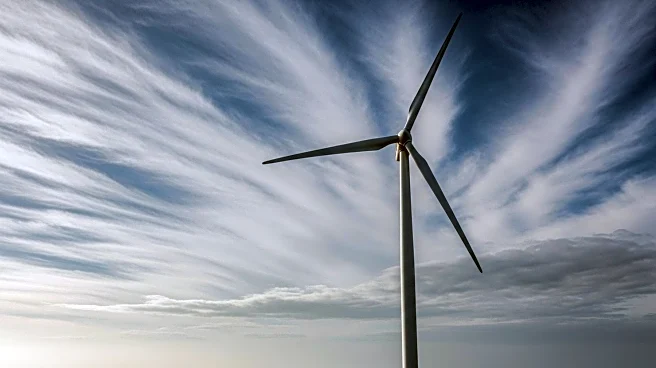What's Happening?
Danish energy company Ørsted has filed a legal complaint against the U.S. Department of the Interior's Bureau of Ocean Energy Management (BOEM) in the U.S. District Court for the District of Columbia. The complaint challenges a stop-work order issued by BOEM on the Revolution Wind offshore wind project, a joint venture between Ørsted and Skyborn Renewables. The project, located off the coast of Rhode Island, was halted on August 22, affecting over 1,000 workers. Ørsted argues that the stop-work order lacks legal justification, as the project had secured all necessary federal and state permits. The Attorneys General of Connecticut and Rhode Island have also announced their intent to challenge the order, emphasizing the absence of any identified legal violations or safety threats.
Why It's Important?
The halt of the Revolution Wind project has significant implications for the U.S. offshore wind industry and its workforce. The project was expected to contribute to renewable energy goals and provide economic benefits through job creation and infrastructure investments. The legal challenge by Ørsted and the involvement of state Attorneys General highlight tensions between federal policies and state-level renewable energy initiatives. The outcome of this legal dispute could set a precedent for future offshore wind projects and influence the U.S. energy policy landscape, particularly under President Trump's administration, which has been critical of the offshore wind sector.
What's Next?
The legal proceedings initiated by Ørsted and the state Attorneys General will likely unfold in the coming months, potentially leading to a court decision on the validity of the stop-work order. Stakeholders in the offshore wind industry, including workers and environmental advocates, are expected to closely monitor the case. The Interior Department's response and any subsequent policy adjustments could impact the future of offshore wind projects in the U.S. Additionally, political dynamics, such as upcoming elections, may influence the administration's stance on renewable energy.
Beyond the Headlines
The stop-work order raises questions about the balance between national security concerns and renewable energy development. BOEM cited unspecified concerns related to national security and interference with maritime activities, which could reflect broader geopolitical considerations. The case also underscores the challenges faced by the offshore wind industry in navigating regulatory hurdles and political opposition, despite its potential to contribute to climate change mitigation and energy independence.










